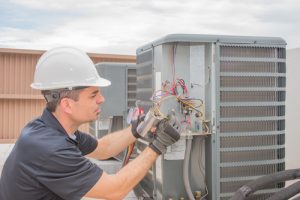 Maintaining an energy-efficient commercial HVAC (Heating, Ventilation, and Air Conditioning) system is essential for businesses looking to reduce their energy consumption and costs. By improving the energy efficiency of your HVAC system, you can not only save money but also contribute to sustainability and reduce your carbon footprint. In this blog post, we will discuss several strategies to help improve the energy efficiency of your commercial HVAC system.
Maintaining an energy-efficient commercial HVAC (Heating, Ventilation, and Air Conditioning) system is essential for businesses looking to reduce their energy consumption and costs. By improving the energy efficiency of your HVAC system, you can not only save money but also contribute to sustainability and reduce your carbon footprint. In this blog post, we will discuss several strategies to help improve the energy efficiency of your commercial HVAC system.
1. Regular maintenance and tune-ups:
Just like any other equipment, your HVAC system requires regular maintenance to operate at peak efficiency. Schedule routine maintenance for your system to clean and replace air filters, check refrigerant levels, inspect ductwork, and ensure all components are functioning properly. Regular tune-ups will not only optimize the performance of your HVAC system but also extend its lifespan and reduce the likelihood of breakdowns, saving you significant costs in the long run.
2. Upgrade to modern and energy-efficient equipment:
If your commercial HVAC system is outdated, consider upgrading to a modern, energy-efficient model. Newer HVAC systems are designed to meet higher energy efficiency standards, consuming less energy while providing the same level of comfort. Look for energy-efficient models that have high Seasonal Energy Efficiency Ratio (SEER) ratings for air conditioning units and high Annual Fuel Utilization Efficiency (AFUE) ratings for heating units. Investing in new equipment may require an initial investment, but the energy savings over time will offset the cost.
3. Install programmable thermostats:
Programmable thermostats allow you to set specific temperature schedules based on your business’s operating hours. By automatically adjusting the temperature settings during off-peak and unoccupied periods, you can reduce energy consumption without sacrificing comfort. Set your thermostats to raise the temperature during warm weather and lower it during cool weather when the building is unoccupied to minimize unnecessary cooling and heating.
4. Implement zone control systems:
Most commercial buildings have varying occupancy levels throughout different areas. Implementing a zone control system allows you to divide your building into different zones, each with its temperature settings. This way, you avoid cooling or heating unoccupied areas, reducing energy waste. Occupied zones can be set to comfortable temperatures, while unoccupied zones can be set to energy-saving settings.
5. Seal and insulate your building:
Proper insulation and sealing are crucial in maintaining a comfortable indoor environment while reducing energy expenses. Ensure your building is well-insulated to minimize heat transfer through walls, roofs, and windows. Additionally, detect and seal any air leaks around doors, windows, and ductwork. Effective insulation and sealing techniques will prevent conditioned air from escaping or unwanted outside air from entering, keeping your HVAC system from working overtime.
6. Optimize airflow and ventilation:
Proper airflow and ventilation significantly impact the energy efficiency of your HVAC system. Ensure air vents and registers are unobstructed and free from dirt and debris. Blocked vents obstruct air circulation and strain the system, leading to energy waste and reduced performance. Regularly clean and maintain your ventilation systems, including exhaust fans, to prevent accumulation of dust and debris, ensuring proper airflow throughout the building.
7. Consider using energy recovery systems:
Energy recovery systems such as heat recovery ventilators (HRVs) or energy recovery ventilators (ERVs) capture and reuse the energy from the exhausted indoor air, transferring it to fresh incoming air. These systems allow you to maintain a continuous supply of fresh air while reducing the workload on your HVAC system. By pre-conditioning the incoming air, you can significantly decrease the amount of energy needed for heating or cooling.
Conclusion:
Improving the energy efficiency of your commercial HVAC system is not only good for your bottom line but also for the environment. Regular maintenance, upgrading to energy-efficient equipment, installing programmable thermostats, implementing zone control systems, sealing and insulating your building, optimizing airflow and ventilation, and considering energy recovery systems are effective strategies to reduce energy consumption and costs. Investing in these measures will not only save you money in the long run but also contribute to a more sustainable future.
